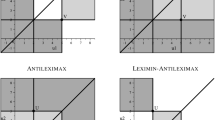Abstract
The logic of inexactness, presented in this paper, is a version of the Łukasiewicz logic with predicates valued in [0, ∞). We axiomatize multi-valued models of equality and ordering in this logic guaranteeing their imbeddibility in the real line. Our axioms of equality and ordering, when interpreted as axioms of proximity and dominance, can be applied to the foundations of measurement (especially in the social sciences). In two-valued logic they provide theories of ratio scale measurement. In multivalued logic they enable us to treat formally errors arising in nominal and ordinal measurements.
Similar content being viewed by others
References
H. D. Block &J. Marschak,Random orderings and stochastic theories of responses, in I. Olkin, S. Ghurye, W. Hoeffding, W. Madow & H. Mann (eds.),Contributions to Probability and Statistics (Stanford: Stanford University Press), 1960, pp. 97–132.
C. H. Coombs,A Theory of Data, New York: Wiley, 1964.
R. Giles,A non-classical logic for physics,Studia, Logica 33 (1974), pp. 399–417.
R. Giles,Łukasiewicz logic and fuzzy set theory,International Journal of Man-Machine Studies 8 (1976), pp. 313–327.
J. A. Goguen,The logic of inexact concepts,Synthese 19 (1969), pp. 325–373.
M. Katz,Difference measurement spaces, Queen's Math. Preprint 9, 1979.
M. Katz,Real valued models with metric equality and uniformly continuous predicates, Queen's Math. Preprint 10, 1979.
M. Katz,Inexact geometry,Notre-Dame Journal of Formal Logic 21 (1980), pp. 521–535.
D. H. Krantz, R. D. Luce, P. Suppes &A. Tversky,Foundations of Measurement, New York: Academic Press, 1971.
F. W. Lawvere,Metric spaces, generalized logic and closed categories,Rendiconti del Seminario Matematico e Fisico di Milano 93 (1973), pp. 135–166.
R. D. Luce,Semiorders and a theory of utility discrimination,Econometrica 24 (1956), pp. 178–191.
F. S. Roberts,Indifference graphs, in F. Harary (ed.),Proof Techniques in Graph Theory, New York: Academic Press 1969, pp. 139–146.
F. S. Roberts,Tolerance geometry,Notre-Dame Journal of Formal Logic 14 (1973), pp. 68–76.
D. S. Scott,Completeness and axiomatizability in many valued logic, in L. Henkin et al (eds.), Proceedings of the Tarski Symposium (Proceedings of Symposia in Pure Math. 25, Providence.) 1974, pp. 188–197.
D. S. Soctt &P. Suppes,Foundational aspects of theories of measurement,Journal of Symbolic Logic 23 (1958), pp. 113–128.
P. Suppes &M. Winet,An axiomatization of utility based on the notion of utility differences,Management Science 1 (1955), pp. 259–270.
P. Suppes &J. L. Zinnes,Basic measurement theory, in R. D. Luce, R. R. Bush & E. Galanter (eds.),Handbook of Mathematical Psychology Vol. 1, New York: Wiley, 1963, pp. 1–76.
A. Tarski,What is elementary geometry, in L. Henkin, P. Suppes & A. Tarski (eds.),Symposium on the Axiomatic Method, Amsterdam: North Holland (1959), pp. 16–29.
Author information
Authors and Affiliations
Rights and permissions
About this article
Cite this article
Katz, M. Łukasiewicz logic and the foundations of measurement. Stud Logica 40, 209–225 (1981). https://doi.org/10.1007/BF02584056
Received:
Revised:
Issue Date:
DOI: https://doi.org/10.1007/BF02584056




